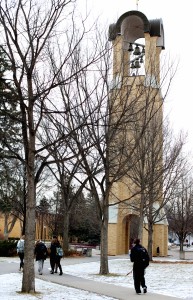The how and why behind canceling classes

The Grumbles have started. As the wind starts to bite fingers and the ice tests our balance, many look forward to only two things: Christmas break and the rare Concordia snow day.
But many wonder – how does Concordia decide to cancel classes?
As the inches pile up, so do hopes for a surprise day off. A short way off in the wee hours of the morning, Concordia Dean and Vice President of Academic Affairs Eric Eliason will think hard – should he call it?
“We don’t have our own meteorologists,” Eliason said. “Sometimes we have to rely on our own reasoning.”
The final decision, usually made before 6:30 a.m., derives from careful consideration. Some weather calls for the careful driving, other weather forces people to think twice before opening the front door.
Bill MacDonald, Director of Public Safety, keeps in touch with Eliason on those bitter mornings. Around 10 p.m., the night before a storm, they keep an eye on the incoming weather. As the night progresses, MacDonald’s 24-hour safety officers keep him informed.
“I keep [Eric] updated on campus conditions, neighborhood conditions and travel or weather advisories from local law enforcement,” MacDonald said. “The next morning, Eric drives in to see how it goes.”
Eliason said the decision affects far more than students and their across-campus classes.
“If twenty inches fall and the plows aren’t out – it’s a no brainer,” Eliason said. “But there are many variables to consider.”
Eliason said he considers many extracurricular events. If possible, he tries to keep the college open for large scheduled events such as recitals, activities, gatherings and concerts.
“People wonder if they will be supported,” Eliason said, explain- ing how many people request events to remain open, whether the college cancels classes or not. “Doors need to be unlocked, walkways need to be shoveled. Sometimes we’re not staffed for it.”
Eliason said the decision rests on more than student needs. Staff and faculty who live off campus may need to travel treacherous highways or unplowed backroads to reach campus.
“It depends on who you are on this campus,” he said. “We’re always aware.”
He explained the pay system: professors and other salary-based employees still earn money when their classes are cancelled, however, hourly-wage workers won’t get their day’s pay. Likewise, what Concordia deems “essential personnel” such as Dining Services workers and Public Safety will likely need to trudge their way to campus to feed students and clear sidewalks.
If those personnel can’t coax their cars out of the driveway, Public Safety will even send a vehicle to pick them up from their homes.
Susan Anderson, a DS worker, is one of those necessary employees.
“They had to come and get me one time,” Larson said. “I couldn’t get out of my garage. Sometimes, I’d like to get the day off, but you know, don’t we all.”
Eliason also watches the decisions made by other organizations. He said West Acres mall seldom closes for bad weather. If it does, it may be time to close Concordia, too. Also, as other institutions close, so do services like day care. Staff and faculty may request the day off to balance their work and home lives.

